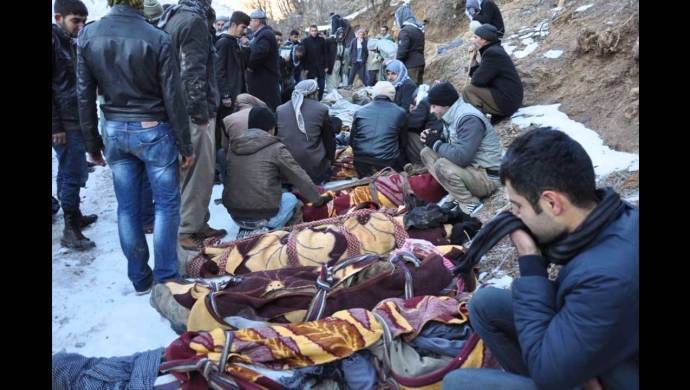The families of 34 Kurdish civilians killed in a 2011 Turkish military airstrike known as the Roboski massacre, the perpetrators of which have never been disclosed by the Justice and Development Party (AKP) government, continue to demand justice 13 years after the incident.
Roboski is the Kurdish place name for the Uludere district of Şırnak province near the Turkish–Iraqi border.
The Roboski massacre refers to the killing of 34 male Kurdish civilians, most of them teenagers, on December 28, 2011, when military jets bombed them. The group of villagers, engaged in cross-border smuggling to make a living, was carrying goods such as gasoline and cigarettes when they were struck. The Turkish military later said the group was mistaken for outlawed Kurdistan Workers’ Party (PKK) insurgents based on intelligence reports.
Despite repeated appeals, no military or government officials have been held accountable. Initial investigations were closed after military prosecutors determined that the killings were the result of human error. The European Court of Human Rights (ECtHR) dismissed the case in 2018, citing procedural failures, while Turkey’s Constitutional Court rejected the families’ subsequent appeal due to technicalities.
Twelve bar associations issued a joint statement on the 13th anniversary of the incident in which they called for accountability for those responsible and urged the judicial and administrative authorities to take action.
The statement condemned the lack of an effective investigation into “this serious crime against humanity.”
It criticized both the Turkish Constitutional Court and the ECtHR for procedural rejections of applications by victims’ families.
The bar associations emphasized that impunity undermines trust in the justice system and deepens divisions in society. They reaffirmed their commitment to the search for truth and justice and declared, “We have not forgotten Roboski, and we will never forget it.” The statement was signed by bar associations from Adıyaman, Ağrı, Batman, Dersim, Diyarbakır, Hakkari, Mardin, Muş, Siirt, Şırnak, Urfa and Van.
The families have consistently rejected offers of compensation, insisting on legal accountability. The Roboski Association, formed to advocate for justice, was later disbanded by government decree, and its former president, Veli Encü, was imprisoned on charges of terrorism.
In Roboski, grieving families continue to dress in black, while women also wear white scarves, symbolizing peace. Many preserve the personal belongings of their lost loved ones as reminders of their absence. Annual commemorations are marked by graveside ceremonies, with families holding photos of the victims and demanding that those responsible be prosecuted.
Leaders of opposition parties and human rights groups have voiced their support for the families’ pursuit of justice.
Şırnak Uludere Roboski’de 13 yıl önce bombalanarak katledilen 34 sivil yurttaşımızı rahmetle anıyorum.
Etkili soruşturma yapılmadığı gibi sorumlular hala korunuyor.
Bu katliamı tüm sorumlular yargılanana ve gerçekler açığa çıkana kadar unutturmayacağız. pic.twitter.com/lyCCkyEixP
— Özgür Özel (@eczozgurozel) December 28, 2024
Özgür Özel, chairman of the main opposition Republican People’s Party (CHP), criticized the lack of accountability, saying, “The perpetrators are still protected. We will not allow this massacre to be forgotten until the truth is revealed and justice is served.”
The victims’ families have called for the reopening of investigations, presenting new evidence that implicates high-ranking officials in the chain of command. They argue that meaningful resolution of the Kurdish question in Turkey hinges on addressing injustices like the Roboski massacre.


